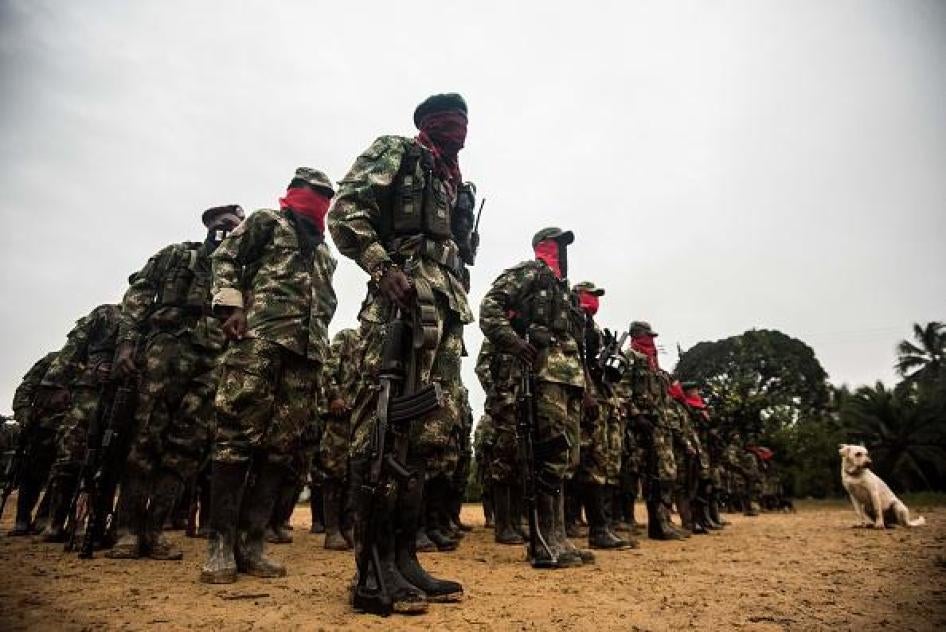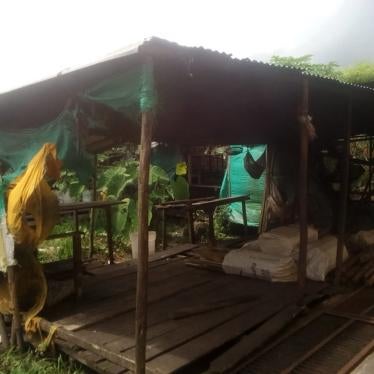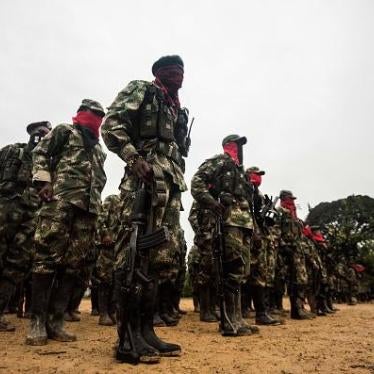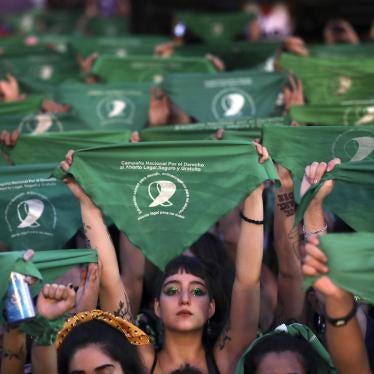(Washington, DC) – Armed groups in Colombia have committed killings and other abuses against civilians in an effort to enforce their own measures to prevent the spread of Covid-19, Human Rights Watch said today.
Since the arrival of the novel coronavirus to Colombia, armed groups in several parts of the country have imposed curfews, lockdowns, and other measures to prevent the spread of the virus. To enforce their rules, the groups have threatened, killed, and attacked people they perceive are failing to comply.
“In communities across Colombia, armed groups have violently enforced their own measures to prevent the spread of Covid-19,” said José Miguel Vivanco, Americas director at Human Rights Watch. “This abusive social control reflects the government’s long-standing failure to establish a meaningful state presence in remote areas of the country, including to protect at-risk populations.”
Between March and June 2020, Human Rights Watch interviewed 55 people in 13 states in Colombia by phone, including community leaders, prosecutors, staff at humanitarian organizations, police officers, and local residents. Human Rights Watch also reviewed pamphlets signed by armed groups, as well as a range of secondary sources, including publications by the Human Rights Ombudsperson’s Office and local human rights groups, and media reports.
Human Rights Watch found that armed groups have informed local populations they were imposing rules to prevent the spread of Covid-19 in at least 11 of Colombia’s 32 states – Arauca, Bolívar, Caquetá, Cauca, Chocó, Córdoba, Guaviare, Huila, Nariño, Norte de Santander, and Putumayo. In at least five, the groups used violence to enforce compliance, and in at least another four threatened violence. The groups have communicated, usually through pamphlets and WhatsApp messages, a wide range of measures that include curfews; lockdowns; movement restrictions for people, cars, and boats; limits on opening days and hours for shops; as well as banning access to communities for foreigners and people from other communities.
Human Rights Watch reviewed 20 pamphlets signed by armed groups that appear to be authentic, based on interviews with local humanitarian workers, community leaders, police officers, and prosecutors. For example, National Liberation Army (ELN) fighters in Bolívar, in northern Colombia, released a pamphlet in early April announcing that they were “forced to kill people in order to preserve lives” because the population had not “respected the orders to prevent Covid-19.” The pamphlet states that “only people working in food stores, bakeries, and pharmacies can work,” saying others should stay “inside their houses.”
The armed groups have imposed brutal “punishments,” including killings, on people for allegedly failing to comply. Groups involved in these crimes include the ELN, groups that emerged from the 2016 demobilization of the Revolutionary Armed Forces of Colombia (FARC) guerrillas, and the Gaitanist Self-Defense Forces of Colombia (AGC), which emerged from the supposed demobilization of right-wing paramilitary groups in the mid-2000s.
On April 26, members of the Jaime Martínez mobile column, which emerged from the 2016 demobilization of the FARC, killed three civilians and injured four others in the southwestern state of Cauca. The victims were attacked in a public park, a prosecutor and an official of the Human Rights Ombudsperson’s Office who investigated the case said. The prosecutor said they had evidence that the civilians were killed for failing to comply with lockdown measures. Fighters had warned the victims that they would be killed if they failed to comply, the prosecutor said.
On June 8, Edison León Pérez, a community leader from Putumayo, was killed. Members of La Mafia, an armed group that operates in the area, appear to have killed him because, days earlier, he had sent a letter to local authorities complaining that the group was forcing local residents to organize checkpoints to question and screen people entering the area for symptoms of Covid-19, a prosecutor who looked into the case said.
Armed groups have burned the motorcycles of people who violated the groups’ movement restrictions. Human Rights Watch documented three such cases, two in Cauca and one in Guaviare.
As of July 13, Colombia had confirmed over 150,000 cases of Covid-19, and more than 5,000 deaths linked to the virus. The government has adopted a series of measures to contain the spread of Covid-19, including a nationwide lockdown that began in late March and remains in effect.
Measures imposed by armed groups have further undermined access to food for communities living in poverty, which had already been limited by the government lockdown. A community leader from the southwestern port-city of Tumaco said that due to armed groups’ rules limiting fishing, residents no longer have fish or shellfish to sell. The 5 p.m. curfew also means they can no longer make a living selling food from street food stands at night. “If [people] dare to go outside, there is no one to buy, so families are starving,” he said.
Armed groups’ measures are at times broader than those imposed by the government, humanitarian workers and community leaders said. The government allows people to leave their homes to access health services or banks, as well as in other cases of serious necessity, even during curfew hours. Yet humanitarian workers said that armed groups in parts of Nariño, Arauca, Putumayo, and Guaviare have not allowed people, including those who are sick, to leave their homes at all during curfews.
Under international human rights law, the Colombian government is obligated to protect the rights to life and physical integrity by taking adequate preventive measures against reasonably foreseeable threats from private actors, including organized criminal groups and other armed groups. International humanitarian law is also applicable to all parties to ongoing armed conflicts in Colombia, prohibits deliberate attacks on civilians, and requires respect for their rights.
The Colombian government also has an obligation to take effective and adequate steps to prevent the spread of Covid-19 to protect people’s right to health, as well as to ensure the rights to food and water.
“Draconian ‘punishments’ imposed by armed groups to prevent the spread of Covid-19 mean that people in remote and impoverished communities across Colombia risk being attacked and even killed if they leave their homes,” Vivanco said. “The government should urgently ramp up its efforts to protect these communities, ensure they have adequate food and water, and protect their health from the effects of Covid-19.”
For further information and a selection of cases documented by Human Rights Watch, please see below.
Covid-19 Measures Imposed by Armed Groups
Numerous armed groups operate in Colombia. Some are parties to the ongoing armed conflicts in the country. Many exercise effective control over specific communities or neighborhoods, enabling them to impose their own measures against Covid-19. In some other parts of the country, groups are challenging government forces’ territorial control.
Armed groups imposing measures to prevent the spread of Covid-19 include the National Liberation Army (ELN) guerrillas; the Popular Liberation Army (EPL); the Gaitanist Self-Defenses of Colombia (AGC); and several groups that emerged from the 2016 demobilization of the Revolutionary Armed Forces of Colombia (FARC) guerrillas, often called “FARC dissident groups.” Human Rights Watch has also documented that Contadores in Nariño and La Mafia in Putumayo have imposed Covid-19 measures.
FARC dissident groups imposing such measures include the Oliver Sinisterra Front and the United Guerrillas of the Pacific, which operate in the southwestern state of Nariño; the Jaime Martínez mobile column and the Dagoberto Ramos mobile column, which operate in the southwestern state of Cauca; the 10th Front, in the eastern state of Arauca; the 7th and the 1st fronts in eastern state of Guaviare; and the Carolina Ramírez Front, in the southern state of Putumayo.
One or more of these armed groups have committed violent abuses in connection with their Covid-19 measures in at least five states – Córdoba, Cauca, Guaviare, Nariño, and Putumayo. In four other states – Arauca, Bolívar, Chocó, and Huila – armed groups have threatened to use violence to enforce their measures, but Human Rights Watch has not documented specific cases of abuse in those states. In Caquetá, the Carolina Ramírez Front threatened to “fine” people who failed to comply. In North Santander, the EPL “invited” people to comply and said their troops would “contribute to control compliance.”
Armed groups have used pamphlets and WhatsApp to establish curfews, lockdowns, and restrictions on movement for people and on opening days and hours for shops. Some armed groups have organized meetings to communicate their rules to the population, humanitarian and human rights officials said.
In late March, the Jaime Martínez column released a pamphlet saying that “[M]any did not understand, did not comply with the lockdown established by the national government, therefore our organization will take control to protect the population.” It said that “The opening times for authorized businesses will be between 8 a.m. and 2 p.m., and during those times people should do their groceries; no one should be on the streets after 2 p.m., except for a medical emergency.”
In early April, the ELN released a pamphlet in the western state of Chocó, listing eight rules. These included a “total closure of the roads,” the prohibition of “any type of public events and meetings” with more than 10 people, a curfew from 8 p.m. to 6 a.m., and an isolation requirement for people who arrive in the area.
Similarly, in late April, the Carolina Ramírez Front released a pamphlet in Putumayo announcing that due to Covid-19 it was “totally forbidden to transit after 7 at night except for sick people.” The pamphlet also said that “Only the previously authorized entry and exit of boats is allowed,” noting that people failing to comply would have to pay a “penalty” of COP 2,000,000 (approximately US$550).
While the government has allowed stores selling food, medicine, and other basic supplies to open, armed groups in the southwestern port-city of Tumaco, in Nariño state, have at times told store owners that they must close, community leaders said. Similarly, the government allows people to leave their houses to access health services or banks, as well as in other cases of serious necessity, even during curfew hours. Yet humanitarian workers said that armed groups in parts of Nariño, Arauca, Putumayo, and Guaviare have not allowed people, including those who are sick, to leave their houses at all during their curfews.
Measures imposed by armed groups have further undermined people’s ability to secure adequate food without providing alternative options, residents, community leaders, humanitarian actors, and local church authorities told Human Rights Watch. For example, even though government rules would allow the sale of food on the streets so long as sellers avoid crowding, one community leader told Human Rights Watch that because armed groups in Tumaco “do not allow street selling or [at times] allow [it] only until 5 p.m.… families do not achieve sufficient income to feed themselves.” Some families started sharing communal noodle soups or are just sharing “one single pound of rice” among all family members, she said.
Killings and Other Violent Attacks
Human Rights Watch documented nine killings in three states connected to armed group measures to prevent the spread of Covid-19. Eight civilians appear to have been killed because they did not comply with the measures. The other victim was a community leader who appears to have been killed for opposing the measures. Ten people were injured in some of these incidents, as well as in one in Nariño.
Killings of Civilians in Cauca
Human Rights Watch documented six killings by armed groups in the state of Cauca. Credible information provided by prosecutors, human rights officials, and humanitarian actors indicates that the groups killed the civilians to enforce measures against the spread of Covid-19.
On April 4, José Rubiel Muñoz Samboní, a farmer, was killed in the community of La Medina after he arrived from a nearby community to meet some friends. A prosecutor who looked into the case and the Human Rights Ombudsperson’s Office believe that ELN guerrilla fighters killed him because he failed to comply with the group’s lockdown in the area.
On April 26, members of the Jaime Martínez mobile column killed Armando Montaño, Weimar Arará, and Humberto Solís and injured four other civilians. The armed group attacked them in a public park, a prosecutor and an official of the Human Rights Ombudsperson’s Office who investigated the case said. The prosecutor said that armed groups had warned the victims that they would be killed if they failed to comply.
Similarly, on May 30, members of the Dagoberto Ramos mobile column attacked four Venezuelan migrants in the Toribío municipality, killing two of them – Johan José Ibáñez Hernández and Yonier Alexis Matute Solano – and injuring the others – Anayibe del Carmen Guerrero Loyo and Erick Alexander Torrealaba Arismendi. The victims had been drinking alcohol in a cellphone repair shop in the urban center of the municipality, an activity that armed groups have banned in the area to prevent the spread of Covid-19, said humanitarian workers. Local humanitarian workers and a judicial official said the victims were most likely killed for breaking the rule. The attack caused fear among the municipality’s Venezuelan population, leading to the displacement of at least 15 Venezuelans, human rights and humanitarian officers said.
Killing of Community Leader in Putumayo
On June 8, Edison León Pérez, a community leader from Putumayo, was killed after the bodyguards assigned to him by the government’s National Protection Unit had dropped him off at his home. León Pérez had been threatened several times, including in connection with his work as the president of a local Neighborhood Action Committee, local humanitarian and human rights officials said. Members of La Mafia, which operates in the area, appear to have killed him in retaliation for sending a letter days earlier to local authorities accusing the group of exposing local residents to Covid-19 by forcing them to staff a health checkpoint, a prosecutor who looked into the case said. At this and other checkpoints established by armed groups in Putumayo, community members ask people entering the area questions related to Covid-19, including what other areas they have visited recently, and at times conduct temperature checks, a local humanitarian worker said.
Pérez’s letter, which Human Rights Watch reviewed, said that:
As you are aware, a health checkpoint has been established by the communities [and]… imposed by the narcotrafficking group that operates in the region, where communities … are forced to have personnel 24-hours [a day] without any protection … [potentially] exposing us to Covid-19.… Many sick people are not allowed to cross [the checkpoint], but people authorized by the narco group face no problems…
Mr. Mayor, as the president of the Neighborhood Action Committee … I am not willing to continue sending my people to death.
Attacks on Vehicles in and around Tumaco
On April 4, armed men shot at a private vehicle on the road from Barbacoas to Tumaco, in the state of Nariño. The car was carrying four people, including a sick passenger and a paramedic, and had a flag that is often used in Colombia to identify vehicles on a “medical mission.” Two passengers were killed, and the others injured.
The attack was carried out by members of Contadores, an armed group involved in drug trafficking that operates in the region, judicial officials and humanitarian and human rights officers who looked into the case said. They said that the group carried out the attack to enforce their order that no one could leave their house after 6 p.m.
Similarly, on the evening of May 30, a private vehicle transporting two prosecutors was attacked on a road near Tumaco. Two bullets grazed the head of one of them; the other was shot three times in the legs.
One of the prosecutors described the incident to Human Rights Watch:
We saw several armed people in civilian clothes on the road. We stopped the car and tried to go in reverse, [but they] started shooting at us. One of them yelled at us: “Get out of the car.”... We identified ourselves as civilians and asked them not to kill us.... They told us to leave.... We drove for a few minutes [and then] asked for help from people who lived nearby. Several came out, but when they saw that we were wounded and bleeding, nobody helped us. They locked themselves in their homes again … one of them approached the car and asked me to stop screaming. He told me that they were forbidden to help us.
Judicial officials and humanitarian and human rights officers familiar with the case said the attack was perpetrated by members of the Oliver Sinisterra Front, which emerged from the FARC. They said that fighters apparently attacked the car because it was not complying with the group’s 4 p.m. curfew. A judicial official in the area said that the group patrols the streets from 4 p.m. until dawn to enforce the curfew. “We live in constant fear, pressured and threatened by the groups,” said a community leader from the area where the attack against the prosecutors took place. “Nothing and no one moves without their knowledge, and if someone dares to move against their orders, they end up dead or disappeared.”
Threats and Other Forms of Coercion
Armed groups have enforced their measures through threats and other forms of coercion. Many of the pamphlets Human Rights Watch reviewed contain threatening language. For instance, in late March, the Oliver Sinisterra Front released a pamphlet warning it would consider people who did not comply with their measures “military targets.” “All commercial and public activities are suspended … and anyone found out of their house after curfew starts will be considered a military target,” they said.
Similarly, a pamphlet released in May by the Jaime Martínez mobile column says that “Those who fail to comply will be held to account under our law with his own life.” “Either you comply or you die.”
Some of the threats in the pamphlets target Venezuelans, whom some armed groups have accused of spreading the virus. For instance, a pamphlet released in late March by the Jaime Martínez mobile column says that the group “will have no mercy” toward Venezuelans who fail to comply with the measures; “they will pay with their death … [or be] expelled.”
Members of armed groups have also communicated their threats verbally. On April 16, members the 10th Front threatened members of the indigenous Hitnü community in the eastern state of Arauca. Fighters told them that they would face reprisals if they left their community, the Human Rights Ombudsperson’s Office reported. Local humanitarian workers said that the entire community is confined in their territory, due to fear of attacks by the 10th Front.
Similarly, human rights officers said that on April 19 members of the 10th Front threatened a group of Venezuelan exiles in the Puerto Jordán community in Arauca. Fighters approached the Venezuelans and threatened to kill them if they did not go back inside.
On April 8, in the northern state of Córdoba, members of the Gaitanist Self-Defense of Colombia held a bus driver for several hours, accusing him of violating their lockdown. Fighters let him go, but forced him to leave the area.
In Guaviare and Putumayo, groups that emerged from the FARC have established checkpoints, often forcing residents to control the access of foreigners to the communities. A community leader from Guaviare described to Human Rights Watch the social control exercised by the 1st Front:
They’re in charge here and we have to obey them…. They order us to put checkpoints on roads; they order they do not want to see anyone on the roads when it gets dark, that whoever moves when it is forbidden must be punished for disobeying.... They say they do this to prevent the virus from reaching us, but they have always imposed their measures for social and territorial control.... We pay attention to them because otherwise they can harm us or harm our families.... No one is going to protect us here.
|
Report
Colombia: Armed Groups’ Brutal Covid-19 Measures
Killings, Threats, and Social Control
Your tax deductible gift can help stop human rights violations and save lives around the world.
Tags
Topic
Most Viewed
-
January 16, 2026
Iran: Growing Evidence of Countrywide Massacres

-
November 25, 2019
A Dirty Investment

-
March 29, 2021
“Everything I Have to Do is Tied to a Man”

-
December 16, 2024
US: Lasting Harm from Family Separation at the Border

-
January 14, 2026
Sri Lanka: UN Finds Systemic Sexual Violence During Civil War





